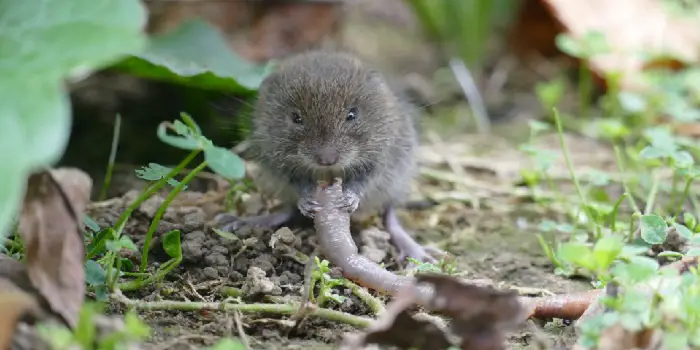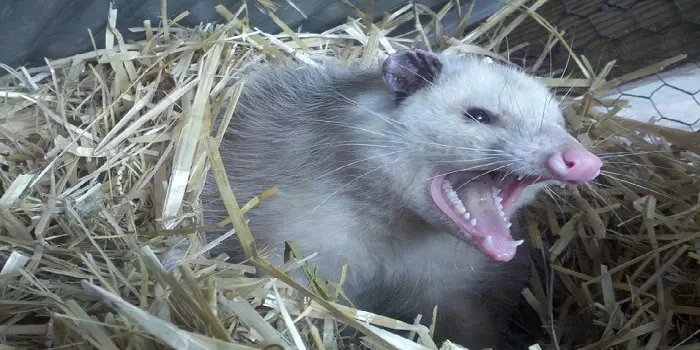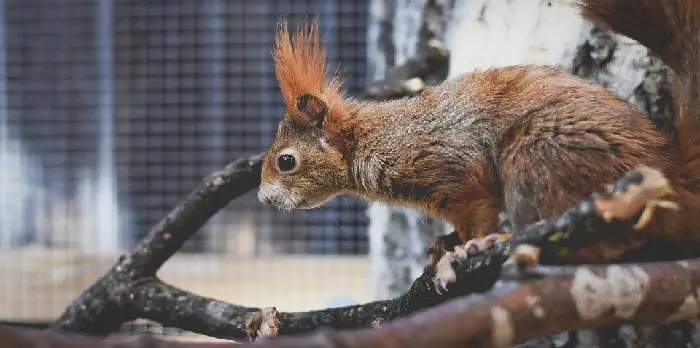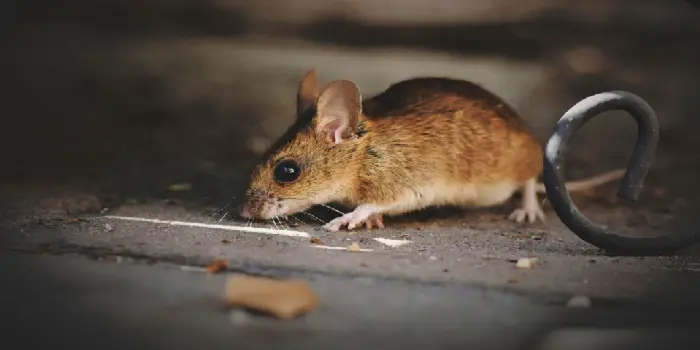
Do you think there is a mouse in your home?
Are you confused because you have detected some droppings in your house and you don’t know which animal it is?
Is it of a mouse or something else like a rat or a cockroach? Will touching these mouse droppings make you sick?
Well, if you want to know how you can identify the mouse droppings and what should be done about them, I will try to explain them in this article.
Briefly, in the below article, I will cover – what mouse droppings look like and how you can deal with them safely.
What Does Mouse Poop Look Like?
How it’s different from the droppings of rats, roaches, and bats?
The first thing you should remember is that mouse poop looks different from rats and cockroaches due to the shape and size.
Typically, a mouse in your house produces between 40 to 100 droppings per day.
The feces of the mouse are small – around 1/8 to 1/4 inches long and sleek. They look like a dark brown rice grain tapering towards the ends.
On the other hand, the feces of rats are ¼ to ½ inch in length with round ends.
And the poop of a roach is a tiny black speck that looks more like grounded coffee or black pepper.
If you have large-sized roaches in your home, their feces look like dark-colored cylinders with ridges all over and are comparatively shorter than mouse droppings.
If you also have bats around your property, differentiating between bat poop and mouse feces may be tough.
To tell them apart, you will need to focus on consistency rather than their shape and size.
While mouse feces are solid and thick, bats can be crushed to powdery form easily.
Will It Be Hard or Soft?
When it’s about how the mouse poop appears, it’s good to know that their appearance varies depending on whether it’s fresh or dried.
Naturally, the fresh mouse droppings will always look wet and appear soft and moist. Plus, if it is newer, it will be darker and shinier.
On the other hand, mouse droppings that are not fresh (a few days to about a week old) will appear to be dull, chalky, dry, and harder.
Remember that the color of the droppings will also depend on what the mouse has eaten inside your home.
Also, most mouse droppings will tend to look off-white after about 48 hours. You will also see them crumbling when touched.
Is Mouse Poop Dangerous to Humans?
In simple short words, yes, the feces of a common house mouse can be dangerous for humans!
Mice and their droppings in your house may carry hantavirus, salmonellosis, hemorrhagic fever, lymphocytic choriomeningitis, and leptospirosis.
And the fact is an infected mouse can send these diseases to others through their urine or droppings.
Some of these diseases can be transmitted to humans as it sticks to dust and airborne particles.
If anyone in the family touches the contaminated dropping, they may get infected from these deadly diseases.
Mouse poop is thus considered hazardous for family members and even for your pets.
What are the other threats?
Apart from the threats of their feces, mice themselves are dangerous animals.
If anyone touches a mouse or has got bitten by it, then it is likely that the virus or bacteria may spread.
If a mouse has entered your pantry and contaminated the food, you have a high chance of getting infected.
Mice can carry ticks and fleas to your home. Ticks have bacteria that cause Lyme disease and viruses which can infect you or your pet.
Mice also pose a threat to your property, wood furniture, and particle boards.
They can also chew your electrical wires which may lead to short circuits or even fire in the building.
Places You Can Find Mice Droppings In Your Home
If you are worried about mouse infestation in your house, then the very first step to getting rid of them is to find the mouse feces behind.
Mice poop in large quantities, so even if you haven’t seen a mouse, their pellets will reveal the story behind it.
You will commonly find their dropping near your stored food.
In general, any food sources like trash bins, pantries, drawers, or kitchen closets will work like a magnet for them.
The other common places where you are likely to discover mouse feces are bathroom cabinets, small hideous areas, closets, air vents, small holes in walls, etc.
Mice look for warm places to stay. Hence you may also find their droppings near appliances that are hot such as microwaves, refrigerators, etc.
You can notice their poops below your furniture too. Additionally, they also reside in the ceilings, walls, attics, garage as well as basement.
If you like late-night snacking, most probably, you may notice mouse pellets next to your bed in the morning.
If you have large trash piled up in your home, check that area for the mice shit.
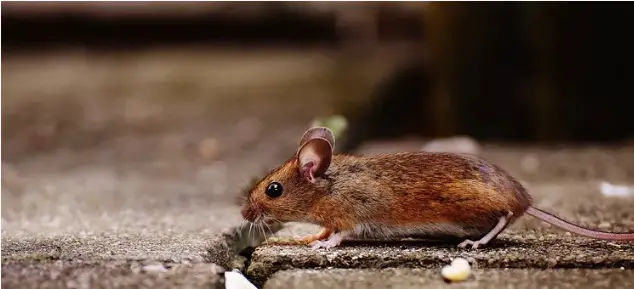
What to Do If You Find Mouse Droppings?
Whether you see a mouse or not, mouse dropping signifies the presence of mice in your home.
Hence, you need to commence by cleaning the mouse droppings and food waste.
Plus, you will need to ensure that none of the food is kept out in the open.
Make sure all your food is stored well. If there are any holes in the drawers and closet, block them as soon as you can.
Remember, mice just need a diameter of a dime to pass through; hence proper sealing is important.
You should also place mouse traps along the walls or in your attic.
Consider placing the traps for at least a week to trap all the animals that may be present in your house successfully.
All these will help trap the mouse and will prevent you from cleaning mouse pellets again and again.
How to Clean Mouse Droppings in Your House?
Before you try to clean and remove the mouse droppings, make sure you wear protective gloves made of rubber, latex, or vinyl at the time of cleaning.
Keep all the doors and windows open at least an hour before you plan to begin cleaning.
Now when you are ready, follow these steps for cleaning the mouse droppings…
Step – 1
Add commercial disinfectant and water OR a mixture of bleach (1-part bleach and 10-parts water) to the feces.
Step – 2
Allow it to get soaked for about 5 to 7 minutes, then pick the dropping by means of a paper towel and immediately throw them in the bin.
If you are thinking of using a vacuum here, then don’t!
Even with less potency, the disease which can be transmitted by air can infect you when you use a broom or a vacuum cleaner.
Step – 3
Ensure you disinfect everything in the area that may have been in contact with feces.
Wipe out all the surfaces with bleach mix or disinfectant and wipe the floor.
Step – 4
Check again carefully and repeat the second step if you find any traces of mouse poop left behind.
Step – 5
Once the poop has been removed completely with a paper towel, you can steam clean your carpet and wash it with shampoo.
You can also steam clean and shampoo your upholstered furniture. If there are any beds or clothes in the room, then also give them a hot water wash.
Step – 6
Now remove your gloves and clean your hands with soap and water.
And that’s it!
You have now cleaned all the menacing mouse droppings safely in your home.
Other Related Questions:
What are mice scared of?
Predators such as cats, dogs, rats, etc., are what scare mice most.
Mouse in the home is also scared of humans, bright lights, loud sounds, ultrasonic sounds, etc.
So, if you are wondering how to remove them from your attic or garage, you can possibly use some of these ways successfully to scare them away.
What’s the best way to catch a mouse?
The rodents, like mice, primarily like to feed on nuts and seeds.
Other food items that attract the mice to nest inside your house include peanut butter, soft cheese, high-calorie sweets, and other fatty foods.
So, you can try to use trap baits like these for luring and catching them efficaciously.
How do you know if you have rats or mice?
The most prominent signs of the mouse or a rat nest in your house are a pungent ammonia smell, scratching sound, chewing marks on your furniture, and greasy trails.
While the feces of the mouse may not have any detectable smell, the urine of a mouse does have a distinct smell much like ammonia.
So, if you notice any ammonia smell in your house which was not there before, it’s most probably the urine they leave behind.
And it’s generally the sign of more than one mouse.
What to do if I vacuumed mouse droppings?
There were reports in the past that confirmed the deaths (due to Hantavirus) when people tried to vacuum mouse droppings they found in their closets, cabinets, carpeted room, garage, and attics.
If the mouse droppings are inside your home, the viruses in them can live for as long as 2 to 3 days at normal room temperature.
However, the ultraviolet rays in sunlight can kill hantaviruses faster if it’s outside.
It, therefore, is recommended not to vacuum or sweep away the mouse droppings if you find them in your home.
If you have unknowingly made the same mistake, worry not and be calm.
You should immediately contact your health care provider to get the testing and treatment done on time.
The Conclusion
The droppings of mice state that you do have mice in your home.
Both the feces and creatures are dangerous for you and your pets.
They not only transmit diseases but also can spoil your food, and destroy your furniture and wiring.
Hopefully, with the help of this article, you can now identify the poop of the mouse correctly.
Do not forget to follow the steps I have mentioned above to get rid of these unwanted pests and clean up their mess.
Share the post "What Do Mouse Droppings Look Like – Is It Dangerous?"

Welcome to ProShieldPest.com. I am Tina Jones. I have been working as a pest removal professional in Winslow, Arizona lately. At present, I love to spend my time with my family as a retiree.
Here I share all my knowledge and experiences to help people understand better how they can stop pests at their homes without actually killing them. Hopefully, the information you will find here will help in safeguarding your home! You can check more about me here.

